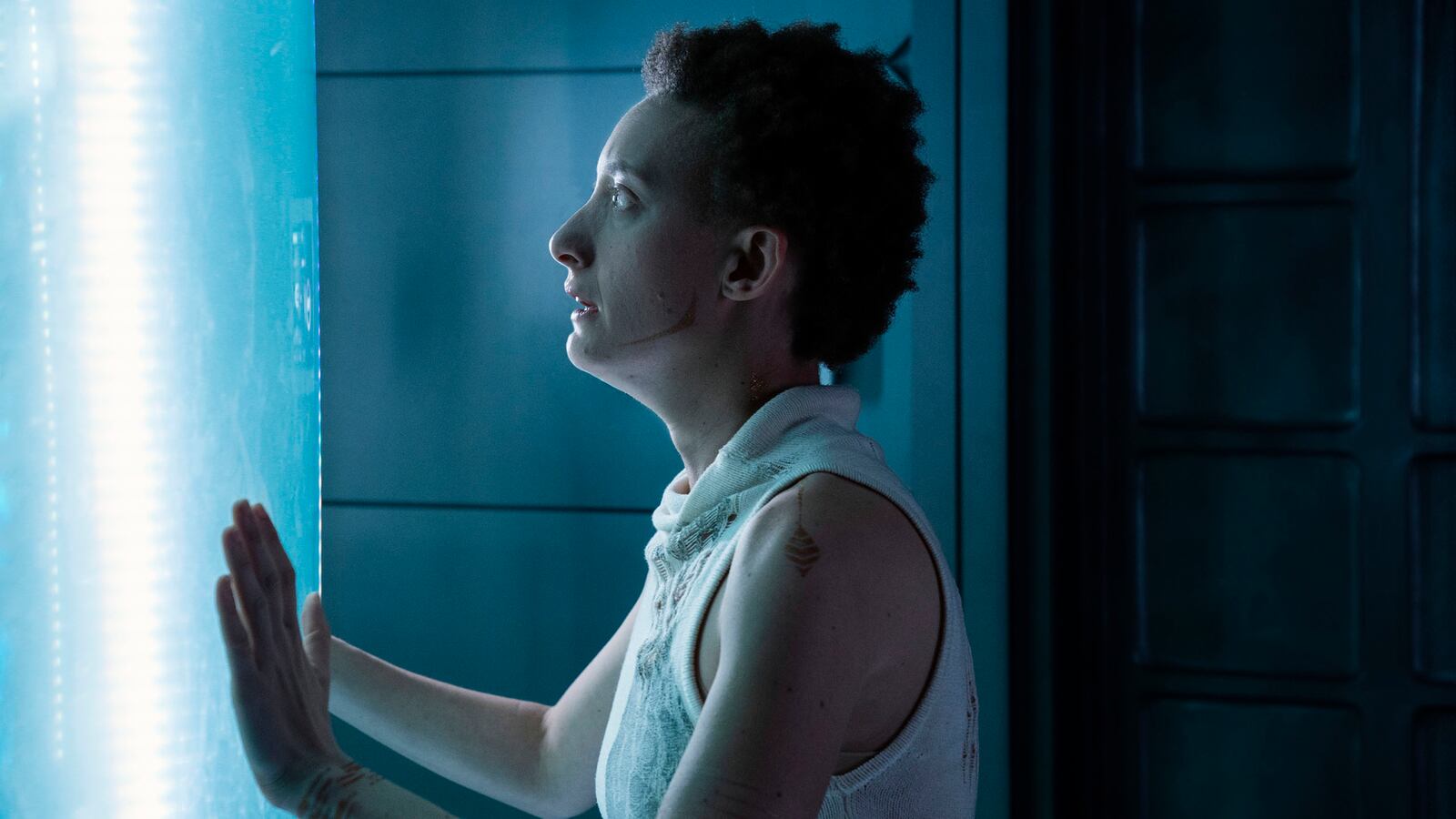Nightflyers is based on a 1980 novella by George R.R. Martin, but those looking for dragons, dwarfs or swords-and-sorcery adventure will have to search elsewhere.
A far cry from the author’s A Song of Ice and Fire novels (i.e. the inspiration for HBO’s Game of Thrones), and previously adapted into a lousy 1987 feature film by director Robert Collector, it’s a haunted house story set aboard an intergalactic spaceship that, in an attempt to make contact with extraterrestrial life, heads out into the vast unknown, where chaos and madness await. Think of it as a kindred spirit to Alien and Event Horizon, with a dash of Cronenberg and the Wachowskis thrown into the mix—albeit quite a bit crazier than those illustrious genre brethren.
Premiering Dec. 2 on Syfy (with all 10 episodes becoming available across the network’s assorted platforms in the coming two weeks), showrunner Jeff Buhler’s take on Martin’s tale involves expanding it considerably, although the novella’s basic nuts and bolts remain. Following a nerve-racking prologue in which a battle to the death ends in creepily unexpected fashion, Nightflyers picks up in 2093 aboard the Nightflyer, a giant craft headed into the Void. There, it hopes to locate an alien race known as the Volcryn, who Dr. Karl D’Branin (Eoin Macken) believes possess an advanced energy source that might help save our dying planet Earth. As if trying to rendezvous with an unknown species isn’t risky enough, Karl has also brought along for the ride Thale (Sam Strike), a telepath whose deadly powers (he’s classified as an “L1” because of prior homicides) may be humanity’s only chance for successfully communicating with the Volcryn.
Thale’s presence, which is opposed by the Nightflyer’s security force, is just the most overt complication facing Karl and his comrades on their mission. Therapist Dr. Agatha Matheson (Gretchen Mol) is tasked with treating Thale while simultaneously collaborating with Karl, her former boyfriend. Karl is still grieving the loss of his beloved daughter Skye (Bronte Carmichael), and dealing with an at-home wife who’s literally erasing their deceased child—and her husband—from her brain, Eternal Sunshine-style. Genetically engineered Melantha Jhirl (Jodie Turner-Smith) is caught in a love triangle of sorts between tech-wiz Lommie (Maya Eshet), who interfaces with the ship through a cable port in her arm, and Captain Roy Eris (David Ajala), who initially appears to the crew only in holographic form. Romantic inklings also soon appear between biologist Rowan (Angus Sampson), a skeptic who nonetheless craves a first encounter with E.T.s, and bee lady Tessia (Miranda Raison), whose placid demeanor is unflappable even in the face of Thale.
And then, of course, there’s the Nightflyer’s central computer, a descendant of 2001: A Space Odyssey’s HAL which watches everyone through red-eyed security cameras and quickly begins malfunctioning, both by taunting its guests with digital visions born from the deepest recesses of their minds, and by trying to outright kill them.
During its early going, Nightflyers leaves significant doubt as to the true nature of its drama’s menace—especially given that most of the characters’ problems could be caused by Thale, whose evolutionary superpowers are as formidable as his fury. Buhler initially pivots most of his action (which is awash in nods to Kubrick’s classic) around Thale, whom Strike embodies as a young British roughneck who resents being treated like a volatile monster (and lab rat) by everyone, save for Agatha, whom he’s known since childhood. The longer it proceeds, however, the more the show makes clear that, despite his lethality, Thale is something of a red herring. The real peril comes from the ship itself, which is possessed by a dark force related to Captain Ellis, and determined—for unknown reasons—to prevent the crew from reaching its intended destination.
Though set in a relatively confined space, Nightflyers puts extensive effort into world-building, developing its narrative context via conversational drips and drabs (and flashbacks), and by seguing between its characters in order to flesh out their respective hang-ups and dilemmas. It strikes a relatively assured balance between keeping its momentum brisk and keeping its audience partly in the dark, the better to sustain suspense. And its more tension-oriented set pieces are capably handled, if lacking major stakes, considering that none of the primary protagonists feel like they’re in real danger of perishing from these early threats.
Where the series suffers most is in the personality department. Agatha and Karl prove functional but reasonably bland centers of attention, and the more beguiling Melantha is—in the first five episodes provided to press—frequently reduced to taking showers or getting undressed and slipping into bed with a female or male partner. There’s a somewhat ho-hum quality to everyone aboard the Nightflyer, which undermines the proceedings’ vitality. Still, Buhler partly offsets this shortcoming by giving each of his players a backstory that informs (and complicates) his or her present circumstances. Moreover, he roots his saga in the issue of memory, and the way its ever-present pull on the here-and-now makes it an impediment to progress—and, in certain cases, a villainous tormentor, and plague, that must be overcome in order to stave off annihilation.
As is often the case with serialized small-screen efforts with grand multi-installment (and multimedia) ambitions, Nightflyers becomes more assured once it gets past its table-setting phase. It also becomes far, far weirder, as the boundaries between the organic and the mechanical, the real and the artificial, begin to dissolve in increasingly wacko ways. By its maiden season’s midway point, the series has taken its somewhat straightforward premise and warped it to a substantial degree, replete with pulsating biotech creations and pseudo-spiritual questions about the nature of the soul. The fact that potential time-space paradoxes (and other out-there storytelling concepts) loom on the horizon only further amplifies the impression that nothing is quite what it seems here.
Nightflyers’ host of mysteries help create a tangled web of allegiances and ulterior motives that will no doubt endear the series to Martin’s Game of Thrones-loving acolytes. It’s Buhler’s whole-hog commitment to serious sci-fi insanity, though, that’s truly enlivening, creating the sense that, like the Nightflyer itself, the show is driven to chart perilous courses in search of novel wonders. So far, at least, it’s headed in the right direction.







